Are you struggling to conceive with no success?
If you’re trying to conceive for more than a year without a success, you need to follow the proven TTC tips to improve your fertility naturally and conceive quickly.
When a natural process of conception becomes a difficulty, every woman undergoes a deep emotional pain silently.
Every negative pregnancy test result, questions their womanhood. They appear to be self-controlled on the outside and put on a brave face and yet they tend to feel insecure and worried on the inside.
The long-term TTC journey unfolds the series of problems like irregular menstrual periods, anovulatory cycles and sometimes even miscarriages. All these TTC problems affect their life emotionally and financially.
The biggest problem is the uncertainty of treatment.
Another frustrating thing is umpteen number of TTC tips and tricks that they read in forums and fertility blogs.
As a result, they are unable to figure out the best TTT tips that really work for her and her husband. The “Top 10 TTC Tips: How to Conceive Quickly and Naturally” blog post is intended to help all such women.
I am a fertility blogger. I have written hundreds of blog posts. Based on my experience and a careful research I am able to figure out the top 10 TTC tips. These TTC tips will help you restore your hormonal balance; restore your regular periods; restore your egg health. All these healthy changes supercharge your fertility unbelievably. And that is why you can conceive quickly and naturally no matter what your age is.
Top 10 TTC Tips: How to Conceive Quickly and Naturally
TTC Tip #1. Enhance Ovulation

Ovulation is your keynote hormonal event every month — it’s not just what you do to make a baby. But do you ovulate every month? Are you sure?
If you have regular periods and are not on hormonal birth control, then you probably do ovulate most months (about two weeks before your period). If you don’t have regular periods, then you just can’t be sure. It’s also possible to not ovulate but then still see a bleed. That’s called an “anovulatory” cycle, and it’s surprisingly common. If you are suffering anovulatory cycle I recommend reading my another article “Anovulatory Cycle: How to Get Pregnant Naturally“.
Short of asking your doctor for a blood test, the best way to know if you ovulate is to look for physical signs of ovulation. Physical signs include a change in vaginal mucus and the position of your cervix, as well as a measurable rise in body temperature.
But what if you don’t ovulate regularly, or just aren’t sure? What can you do about it? Ovulate Regularly
This is very important…
The easiest and the fastest way to get pregnancy is coinciding the baby dance with the ovulation date.
TTC Tip #2. Maintain Alkaline Balance Between 7.0 And 8.0 In Your Body
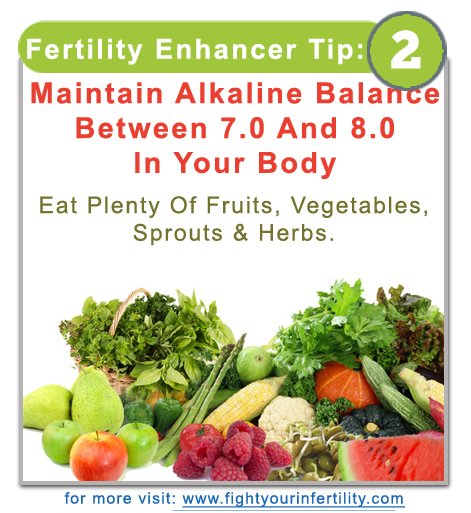
Some women who are trying to get pregnant may be having difficulty due to a pH imbalance. You can check your level at home and remedy the issue through many foods, spices and drinks.
For optimal hormonal functions in women, it is important to factor in the alkaline/acidity level balance when trying to conceive. Bear in mind, proper pH balance in women is vital to one’s overall health and not just for conception and pregnancy.
A simple at home urine test can determine whether or not a woman’s pH balance is acceptable. Using Medical pH Test Strips one can determine levels quickly and easily. These strips determine one’s urinary pH, which is generally a good indicator of how acidic total body pH is. An acceptable urinary pH range should be between 6.5 in the a.m. and 7.5 by evening.
Studies indicate hostile cervical mucus environments, often caused by high acidity levels in women, can hinder sperm and reduce the viable number of sperm considerably. To combat this dilemma, there are numerous dietary choices that can reverse high acidic levels and raise a woman’s alkaline level to an acceptable one or neutral one, thus allowing sperm to travel through the cervical mucus more easily. balance alkaline/acid levels
TTC Tip #3. Improve Metabolism
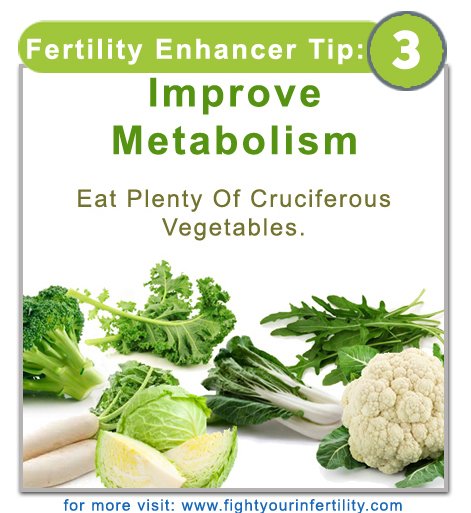
Reproduction is highly dependent on diet and the ability to use nutrients to grow and generate energy. This is clearly seen in women, who must provide all the nutritional building blocks required to support a growing embryo.
As a result, metabolic diseases like diabetes and obesity are closely linked with several female reproductive disorders such as Infertility, polycystic ovary syndrome, and ovarian cancer. Link between metabolism and Infertility
TTC Tip #4. Cleanse Your Colon
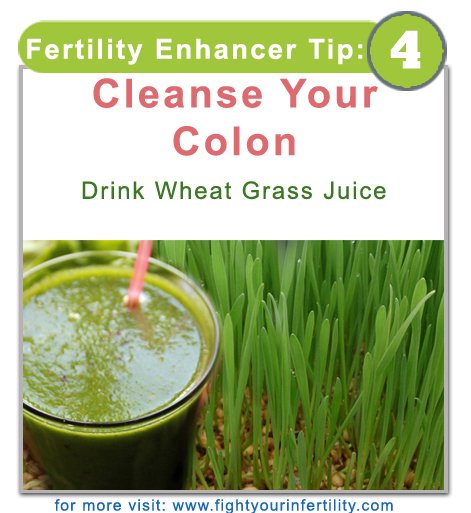
Increase chances of conception:
Pregnancy makes a lot of demands on your body – you need more sleep, more nutrients, more self-care in general. Cleansing your body and switching to a healthier lifestyle beforehand gives you one less thing to think about when you do get pregnant.
It also increases your chances of conception because you’ve removed any foods that might be damaging your gut, allowed your body time to heal and balance your hormones and put your body in the optimum state for getting pregnant.
Balance Hormones:
One reason for hormone imbalance can be toxins. According to Dr. Travis Deuson, Medical Director of BodyLogicMD of Encino, even if you’re hormone levels are adequate, your body may not be using them properly because toxins are blocking the pathways.
One key way to balance your hormones is to lower your exposure to toxins. But what about toxins that are already in your body? Cleansing can flush them out, enabling your body to begin healing and get back in balance. Cleanse and detoxify
TTC Tip #5. Optimize Your Digestion
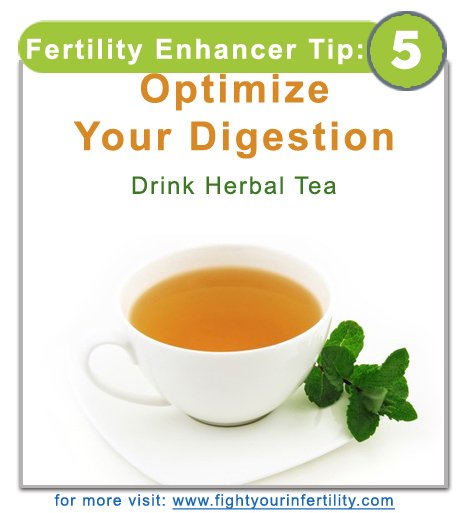
Most people don’t realize that there is a strong connection between gastrointestinal health and fertility. This is because the health of the gut affects the reproductive system in many subtle ways.
The obvious signs of digestive problems include constipation, diarrhea, heartburn or acid reflux, abdominal bloating, sharp or dull abdominal pains, gas, and urinary irritation. But many other symptoms show up when the gut isn’t working properly, including chronic sinus, ear, or vaginal infections; joint pain; headaches; foggy thinking; fatigue; and mood disturbances. All of the systems of the body are interconnected, and subfertility or infertility can definitely be related to gut issues as well. Digestion affects fertility
TTC Tip #6. Reduce Your Stress And Anxiety

It’s also possible that stress simply alters hormones too much and makes it much harder for the body to effectively operate. We know that stress can cause women to stop having periods, and stress can lower sperm count in men. Perhaps hormones and the way they’re altered by anxiety plays a significant role.
No matter the cause, it’s clear that anxiety really is trouble for your fertility, and if you’re constantly under stress and pressure, it’s possible that’s affecting your ability to conceive.
Stress Over Having a Child
Millions of men and women struggle with anxiety, stress, and anxiety disorders every day. It’s actually a statistic that is on the rise, indicating that more and more couples may be finding that anxiety is affecting their ability to have a child.
But what’s amazing, and also unfortunate, is that you may be causing that anxiety on yourself by trying too hard to conceive. Both men and women experience a great deal of pressure believing that if they can’t conceive there is something wrong with them, and that pressure can actually lead to their own fertility problems. More
Reducing the stress is a MUST to restore your fertility
Stress is caused when you are stuck with the painful past or when you stuck with fear about your future. Your body and brain wasn’t made to handle constant stress.
TTC Tip #7. Increase Your Hubbies Sperm Count

Startling new research has revealed that 90% of male infertility problems are caused by the failure to produce enough sperm. Fortunately, many men can rectify this troubling issue just by changing their diet. Increase sperm count
Is your hobby seminal fluid is like water with white color?
Male semen should be like a thick gel and shouldn’t be like the water. Producing healthy sperm in the right amounts requires healthy body.
Your hubby can improve his fertility health with proper mix of vitamins and supplements. Here is The Best Male Fertility Kit For All the Sperm Problems.
TTC Tip #8. Enhance Cervical Mucus Quality
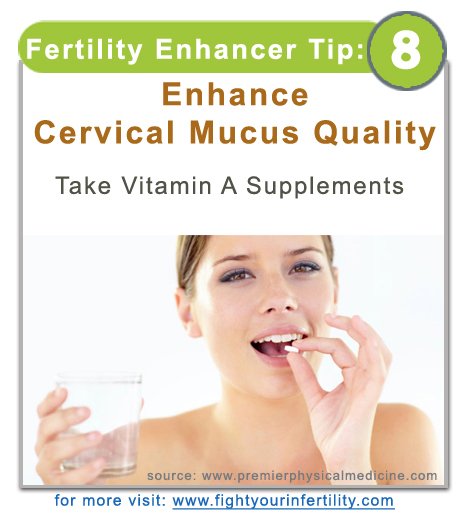
Cervical mucus, often abbreviated CM, may not have the most pleasant sounding name but it is an important part of your everyday bodily functions. It has huge importance to TTC couples…
Look…
If you do not produce healthy cervical mucus, it can hinder your baby-making plans.
But you are nothing to worry. All that you needed is Sperm and Fertility Friendly Baby Dance Lubricant to be successful in getting pregnancy. Click here for more details>>>
TTC Tip #9. Eliminate Parasites From Your Body
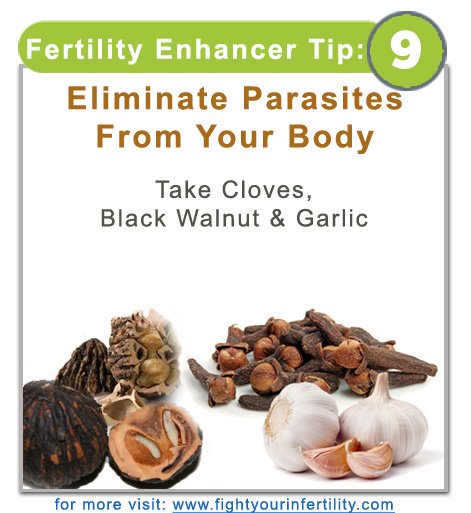
There are reports that some protozoa, helminths and fungi may impair women’s reproductive capacity, causing deformities of the genital tract, so that conception is impossible, or, if it does occur, normal implantation and development of placenta are impossible. Eliminate
TTC Tip #10. Nourish Your Liver
Previous studies have suggested that diet may have an impact on fertility, but this latest research provides new insight into the important role of the liver in fertility. The study showed that estrogen receptors in the liver are critical for maintaining fertility…liver plays a key role in fertility

Take Milk Thistle Seed Extract…
The way of ensuring optimum liver function is the same as the approach used to help couples overcome infertility to have a healthy baby, it includes a low toxic lifestyle: a healthy, liver cleansing diet; no coffee or alcohol consumption; avoidance of chemicals, recreational substances, smoking and any other things which have been shown to negatively affect general health as well as adding in other things which can be beneficial — such as the recipe I share with you below. Nourish Liver
How to Save Your Fertility
Here is the truth!
Science has linked broad range of health problems including fertility related issues to CELLULAR DAMAGE.
The solution is this….
Your body REQUIRES a well balanced blend of antioxidants to REVERSE the DANGERS of poor dietary choices, decreasing egg health and increasing toxicity.


